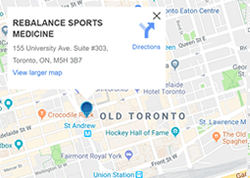Restless Legs Syndrome: Causes, Symptoms, Treatment and Exercises
 Restless Leg Syndrome (RLS) is a neurological syndrome that is not well understood but affects 3-5 % of the adult population. It is sometimes known as Willis-Ekbom Syndrome, after two of the physicians who described it. Sleep disruption is one of the most frustrating issues for patients, because of the strange sensations that come on as people are still or try to settle to sleep, causing an uncontrollable urge to move. Most patients will describe the sensations as “creeping” or the feeling that “there are worms crawling inside my legs”. Symptoms will worsen at night, and often with rest or sitting still, but are relieved with movement.
Restless Leg Syndrome (RLS) is a neurological syndrome that is not well understood but affects 3-5 % of the adult population. It is sometimes known as Willis-Ekbom Syndrome, after two of the physicians who described it. Sleep disruption is one of the most frustrating issues for patients, because of the strange sensations that come on as people are still or try to settle to sleep, causing an uncontrollable urge to move. Most patients will describe the sensations as “creeping” or the feeling that “there are worms crawling inside my legs”. Symptoms will worsen at night, and often with rest or sitting still, but are relieved with movement.
Diagnosis is “clinical” meaning that it can be made by your clinician in his or her office based on
symptoms. There are no tests specifically for RLS. RLS was first described in the 1600s and continues to be researched in sleep clinics. It is known in two forms: primary RLS, which has a strong genetic link and affects women 2:1 vs men, and comes on before age 45, and secondary RLS, which has an onset after age 45 and typically has more severe symptoms and faster progression. Men and women are approximately equally affected.
What are Conditions of Restless Leg Syndrome
The most common conditions that are associated with RLS are spinal cord conditions, kidney disorders, iron deficiency, pregnancy, and peripheral nerve conditions. Research has found that low iron levels in a part of the brain that produces dopamine are linked to symptoms. Iron is necessary for the cells to produce adequate dopamine, so low blood levels of iron or difficulty getting the iron across the blood-brain barrier can be a contributing factor. Iron supplementation can be helpful in reducing symptoms. Sleep apnea also seems to worsen the symptoms, and treatment for sleep apnea can improve quality of life for RLS sufferers.
How Physiotherapy can help with Restless Leg Syndrome
One study looking at exercise showed a significant improvement in symptoms with the addition of strengthening and cardiovascular conditioning three times a week. 28 participants were supervised for 12 weeks and RLS severity scores dropped 39% compared to baseline scores. The control group had 8 % lower scores. Exercise is a relatively unresearched modality for RLS, despite poor cardiovascular conditioning being associated with more severe symptoms. A physiotherapist can work with patients to develop an exercise program tailored to an individual’s needs.
Dopaminergic medications usually used to treat Parkinson’s disease can be helpful for symptoms, but have also been shown to cause a worsening of symptoms known as ‘augmentation’ in some people. SSRIs and SNRIs have been anecdotally reported to trigger RLS in some patients, and the link to dopamine production continues to be researched.
What should be avoided with Restless Leg Syndrome
Caffeine, alcohol, and nicotine have all been shown to increase symptoms, and are best to avoid, especially late in the day. It is helpful to maintain a regular sleep pattern, and may be useful to try warm baths before sleep. RLS that appears during pregnancy will usually disappear after delivery, but generally, RLS is a
chronic condition and continues to worsen with age.
If you are suffering from Restless Leg Syndrome and would like to book in with one of our experienced physiotherapists, please contact us today.
References:
- Natarajan R. Review of periodic limb movement and restless leg syndrome. J Postgrad Med [serial online] 2010 [cited 2021 Apr 29];56:157-62. Available from: https://www.jpgmonline.com/text.asp?2010/56/2/157/65284
- Chaiard, J. and Weaver, T.E. (2019), Update on Research and Practices in Major Sleep
Disorders: Part II—Insomnia, Willis?Ekbom Disease (Restless Leg Syndrome), and
Narcolepsy. Journal of Nursing Scholarship, 51: 624-633.
https://doi.org/10.1111/jnu.12515 - Aukerman MM, Aukerman D, Bayard M, Tudifer F, Thorp L, Bailey B. Exercise and restless legs
syndrome: A randomized controlled trial. J Am Board Fam Med 2006;19:487-93
Laurie Bickerton, FCAMPT Physiotherapist
Laurie Bickerton is a FCAMPT physiotherapist practicing at Rebalance Sports Medicine in downtown Toronto.



 What to Expect From Your First Physiotherapy Visit
What to Expect From Your First Physiotherapy Visit The Benefits of Fascial Stretch Therapy [Demo]
The Benefits of Fascial Stretch Therapy [Demo] How Does Physiotherapy Work?
How Does Physiotherapy Work? Best Exercises for Low Back Pain
Best Exercises for Low Back Pain